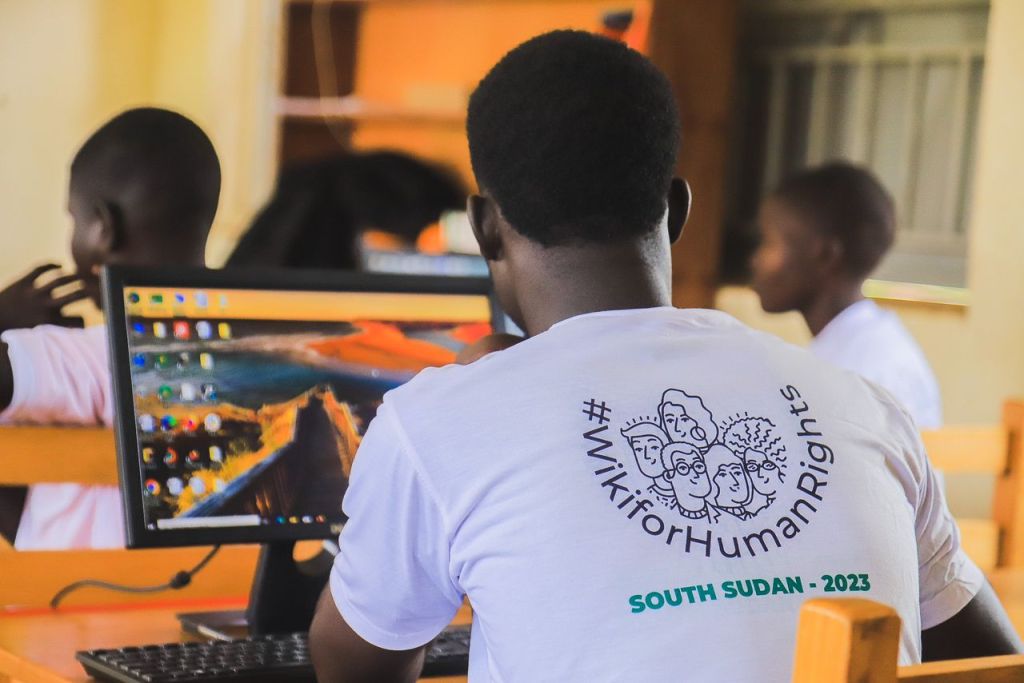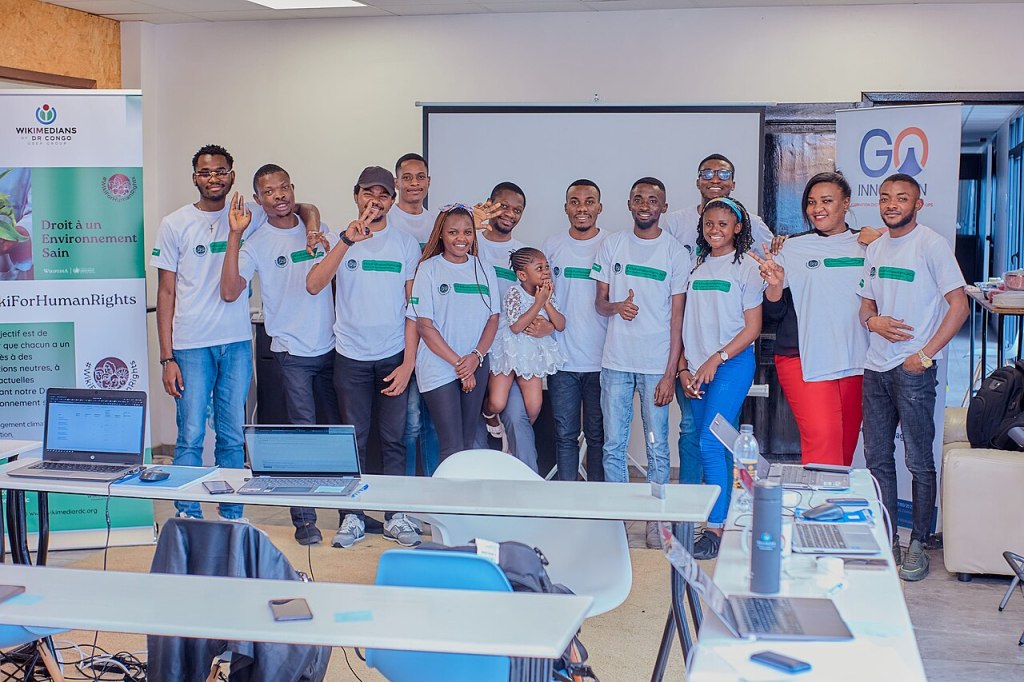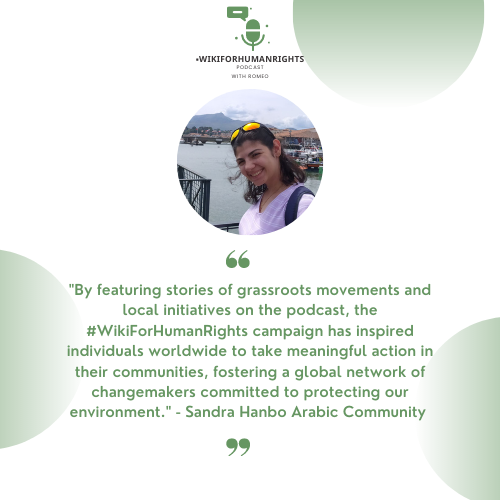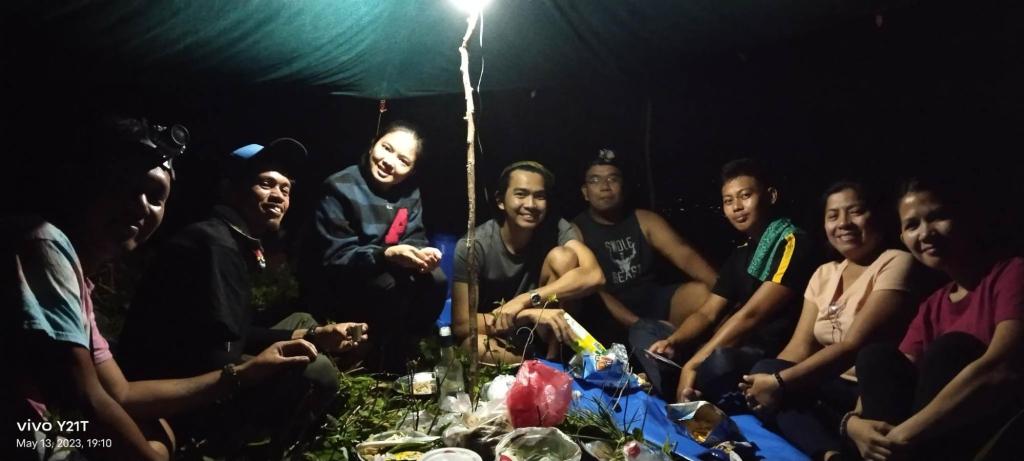Organizing campaigns that center the knowledge of Africans, especially on climate justice, has long been a passion of mine. I joined the movement in 2019 and since then have been involved in organizing local campaign activities and supporting jury processes for events like Wiki Loves Africa, WikiForHumanRights Nigeria and Wikipedia Pages Wanting Photos. As part of the Regional Committee for Wikimedia Foundation Funds for the Middle East and Africa, I have also supported grant-making in the MEA region. In August 2021, I kickstarted WikiVibrance, an initiative that amplifies youth voices in the Wikimedia movement. Through these experiences, I discovered the complexities of campaigns and their differences from individual editing, igniting my curiosity to delve into the subtleties of campaign dynamics in the Wikimedia movement.
Since October 2022, I have been working as a Senior Organizing Fellow at the Wikimedia movement and the UN Human Rights Council, and promotes public knowledge on Right to a Healthy Environment. In 2023, the campaign, which took place from April to June, involved an international writing contest and regional events, engaging Wikimedia communities, organizers, volunteer editors and external partners from across the movement.

Lomoraronald, CC BY SA 4.0
While organizing the campaign, I have witnessed the movement accomplish 67 local events in the Maghreb, Middle East, Africa, Asia, Latin America, North America, Lusophone Countries, Northwestern Europe, Caribbean as well as Central and Eastern Europe. Over 900 people have participated in the campaign, creating over 9000 Wikipedia articles, 5000 Wikidata items and 7000 uploads on Wikimedia Commons. The work done this year to close knowledge gaps on climate is commendable and no small feat for movement organizers in an age of disinformation and green-washing. To support the movement in its efforts to respond to the need for credible content on climate and sustainability, I worked with regional coordinators and facilitated capacity building spaces for these incredible volunteers.
In this work, I have come to understand how we can better support the movement’s efforts to fill gaps related to topics for impact. This fellowship has elevated three important lessons that we can use to support campaigns like WikiforHumanRights going forward: first, we need to employ regional coordination for collective action and learning; second, we need to embrace diverse forms of expression and inspiration; and third, we need to tell our story collectively as an open movement.
Collective action requires one big message, facilitated through regional coordinated activities
The Wikimedia Movement is big and decentralized. Running a campaign necessitates effective communication across various platforms and languages. Previously, disseminating the WikiforHumanRights campaign launch webinar invitation (for example) required sharing in different language Wikimedia mailing lists, Affiliates’ mailing lists, Telegram, Community Facebook groups, and Whatsapp. The burden of this communication for a central organizer would normally be overwhelming. Recognizing this challenge, this year, we worked with regional coordinators to reach more volunteers in a language and platform that made the most sense for their intended audience, and consequently we empowered a wider network of communities to participate in the campaign.
Regional Coordinators provided varying forms of support including:
- Language Translations – Translating campaign related emails, community posts, social cards, social media posts and interpretation support in regional meetings.
- Outreach – Mobilizing volunteers for participation and building energy for the campaign in different Wikimedia communities.
- Regional Office Hours – Organizing meetings to share the campaign theme, scope, tactics, topic list, timelines, communication toolkit, resources, and contact points.
- Capacity Building – Organizing training sessions such as Africa weekly list-building sessions, Wiktionary session, and grant application process.
- Easy Access to Information – Sharing translated campaign news with organizers and editors through emails, Telegram, Whatsapp, Direct messaging, and other community specific communication channels.
- Regional List Building – Creating Wikipedia, Wiktionary, Wikiquote and Wikidata local topic lists for the African Region
- Grant Applications – Guiding new organizers through the Fluxx system, timelines, and application questions.
- Design Support – Creating social cards for campaign regional activities.
Our listening tours with regional coordinators pinpointed interest for an inter-regional knowledge sharing. Through Let’s Connect, organizers co-developed their campaigns to address regional requirements. This facilitated valuable exchanges, such as African organizers learning from their LATAM counterparts about utilizing the Wikipedia Library and online research platforms to find credible sources for creating Wikipedia articles. Let’s Connect provided accessible peer learning and capacity development spaces, with potential for reaching those who missed attending or watching the session recordings with specific knowledge to implement impactful campaigns in their context.

VALENTIN NVJ, CC BY SA 4.0
Centering capacity building in campaigns
Our listening tours revealed the need to simplify the campaign theme and work with local relevant lists. To achieve this, we implemented regional support hours, surveys and the Africa weekly list-building sessions to clarify the broad theme of ‘’Right To A Healthy Environment’’. Organizers developed regional sub-themes that resonated with their local context such as Gender and Biodiversity in LATAM; Biodiversity loss in the Arabic community and Climate Change impact, mitigation and adaptation in Africa.
To empower organizers, we organized two global sessions on listbuilding and Petscan. Not only does learning these tools help with WikiForHumanRights, but also supports other campaigns and content creation efforts such as Wikimedia-in-Residence activities.
Inspired by the global list-building training, African regional coordinators facilitated weekly sessions to help organizers learn list-building skills. 20 organizers and community members participated in a 1-month period creating 500 Wiktionary, Wikipedia article, Wikidata and Wikiquote lists context relevant lists. This shows the space regional coordinators could create for organizers to innovate and learn freely together.
If we want knowledge equity, we need to embrace diverse forms of expression and inspiration
Community members in the movement find inspiration in different ways. I was inspired by the different ways people expressed themselves in the WikiForHumanRights 2023 campaign. We saw communities draw on different forms of motivation to lead impact, employ diverse communication tactics, facilitate intercommunity learnings, support community efforts and find spaces to tell stories of community work especially those not easily communicated on the Meta Page or in grant reports.
One place I also saw an organizer build something new is the 2023 podcast about the campaign: After learning about different perspectives for organizing in the 2022 Organizer Lab, Romeo Lomara initiated the WikiForHumanRights 2023 Podcast to elevate the campaign work, featuring stories of implementing communities. Organizers want to create visibility for their work by gaining a broad audience, but also want to hear from other communities. We need to tell stories of the work of communities collectively as a movement as a way of building energy, inspiring people and helping affiliates grow. According to Sandra Aceng from Wikimedia Uganda, ‘’Listening to the personal stories and struggles shared on the #WikiForHumanRights Podcast has instilled a sense of hope and renewed determination within our community, reminding us that together, we can create a sustainable and just world’’.

Lomoraronald, CC BY SA 4.0
The Wiktionary tactic, where volunteers documented climate change and environment-related vocabulary in diverse languages, was exciting for communities from the Philippines, Maghreb and African regions. The Philippines exhibited a broad range of campaign activities including photo hike sessions that invited youth participants to join the campaign experience. In addition, WikiVibrance, YOUNGO and Cambridge Climate Society collaborated to engage over 90 youth climate activists on how to adopt a multidisciplinary approach to building open climate knowledge and telling stories of youth climate action on Wikimedia Projects.
Different Wikimedia communities connected through the campaign. Wikimedia UK collaborated with diverse communities on languages such as Irish, Igbo, Swahili, French, Yoruba, and Igbo, fostering connection with the international wikimedia community.
The Maghreb region’s use of video promotion in Arabic and sign languages emphasized the importance of protecting the environment. It was a unique call to action to participate in open knowledge. To further amplify community action, we launched the ‘’WikiForHumanRights 2023 Campaign this Week’’ storytelling practice on LinkedIn, spotlighting movement mobilization and participation in open climate knowledge.
As Meta Organizers, we learn by doing these activities that are required to effectively build and document knowledge in the movement
For me, the Fellowship was more than about doing a project, but about connecting across what is sometimes a complicated movement. We develop effective communication and listening skills by working remotely in diverse international cross-cultural teams. Fellowship roles and similar activities provide an excellent opportunity for meta organizers to interact with diverse Wikimedia communities in Africa, Middle East, Maghreb, LATAM, Europe, Asia, North America and the Caribbean among others. It is in these small supportive interactions that we grow from learning innovation, problem solving and teamwork.
If affiliates and other campaign organizers want to strengthen their capacity to build public knowledge, I invite them to embrace programs that employ collective action in learning region specific skills, innovating actions that cater for their context and storytelling that accompanies the international wikimedia community in the journey of our work as an open movement.
x

Can you help us translate this article?
In order for this article to reach as many people as possible we would like your help. Can you translate this article to get the message out?
Start translation
